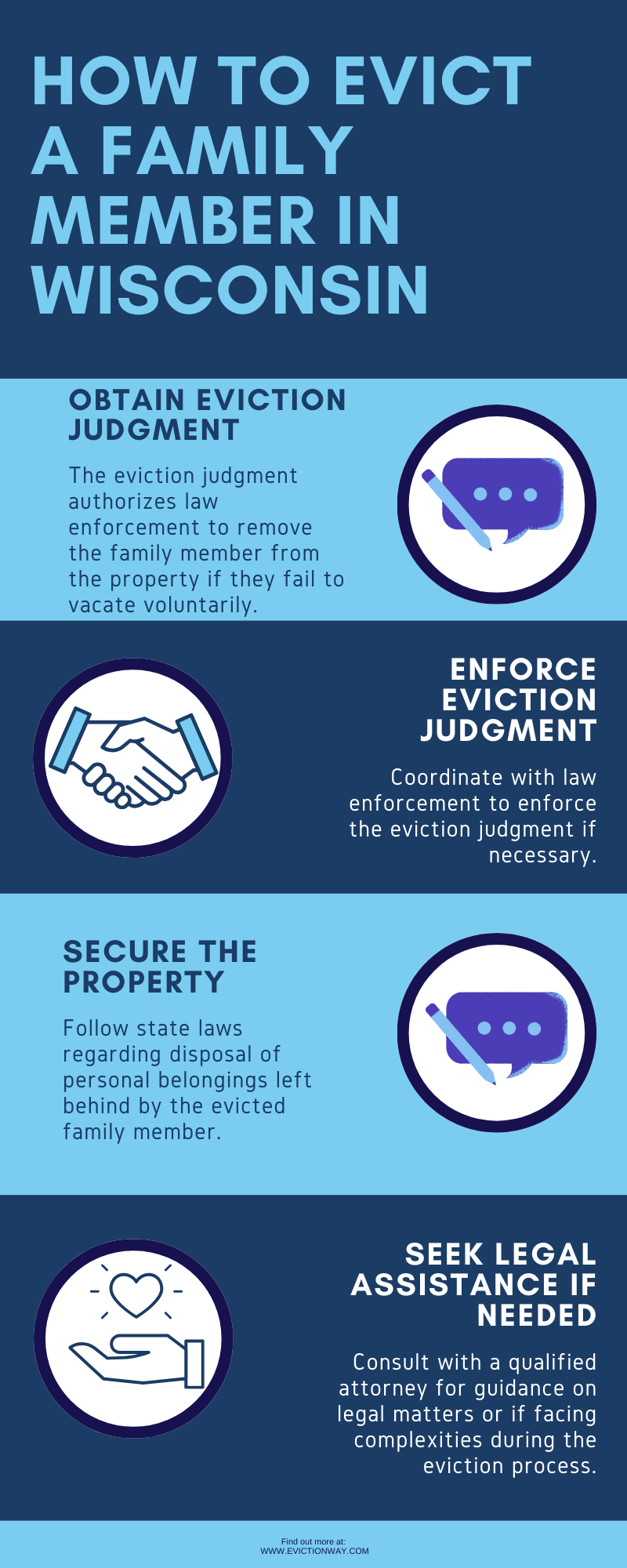Evicting a family member can be a difficult and emotional process, especially in Wisconsin. The laws governing evictions are complex and can vary from state to state. In this blog article, we will provide you with a step-by-step guide on how to evict a family member in Wisconsin. We will also share tips on how to do it politely and legally.
First, you need to determine if you have the legal right to evict your family member. In Wisconsin, you can only evict a family member if they are not paying rent, have violated the lease agreement, or are causing damage to the property. If you believe that your family member is violating the lease agreement, you should first try to resolve the issue with them directly.

The eviction process in Wisconsin can be complex and time-consuming. It is important to follow the steps carefully and to seek legal advice if you are unsure about anything. We will provide you with more information on the eviction process in Wisconsin in the next section of this blog article.
How To Evict a Family Member In Wisconsin
Evicting a family member can be a difficult and emotional process, but it is sometimes necessary to protect your rights and property. If you are considering evicting a family member in Wisconsin, it is important to understand the legal process and your rights as a landlord.
1. Give Proper Notice
The first step in evicting a family member is to give them proper notice. In Wisconsin, you must give at least 28 days’ written notice to vacate the property. The notice must be served in person or by certified mail, return receipt requested.
2. File a Complaint with the Court
If your family member does not vacate the property after receiving the notice, you will need to file a complaint with the court. The complaint should state the grounds for eviction, such as nonpayment of rent or a violation of the lease agreement.
3. Attend a Court Hearing
Once you have filed a complaint, the court will schedule a hearing. At the hearing, you will have the opportunity to present your case and your family member will have the opportunity to present their defense.
4. Obtain a Judgment
If the court finds in your favor, you will be granted a judgment for possession of the property. This judgment will give you the legal right to evict your family member.
5. Enforce the Judgment
Once you have obtained a judgment, you can enforce it by having the sheriff evict your family member. The sheriff will physically remove your family member from the property and change the locks.

6. Seek Legal Advice
Evicting a family member can be a complex and challenging process. It is important to seek legal advice from an experienced attorney to ensure that your rights are protected.
How Much Does it Cost to Evict a Family Member in Wisconsin?
| Expense Type | Estimated Cost | Notes |
|---|---|---|
| Filing Fee | $200 – $500+ | This is for small claims court, where most evictions are filed. |
| Summons Fee | $2 | Paid for each summons issued in the case. |
| Service of Process | Varies (Approx. $35-$100) | Cost can depend on the method of service and the provider. |
| Attorney Fees | Varies | Hourly rates or flat fees can apply if an attorney is consulted. |
| Writ of Restitution Fee | $5 | Obtained after a judgment in favor of the landlord. |
| Sheriff’s Eviction Fee | $130 – $150 (estimate) | Fee for the sheriff to oversee the eviction. |
| Lost Rent and Other Damages | Varies | Potentially recoverable depending on the lease and situation. |
The cost of evicting a family member in Wisconsin can vary depending on several factors, including the county in which you live, the complexity of the case, and whether you hire an attorney.
Generally, you can expect to pay between $200 and $500 in court filing fees and other costs. If you hire an attorney, you can expect to pay an additional $500 to $1,500.
In some cases, you may be able to get free or low-cost legal assistance from a legal aid organization. If you qualify for legal aid, you may be able to get help with filing your eviction paperwork and representing you in court.

FAQs: Evicting a Family Member in Wisconsin
Here are some of the most asked questions.
What are the grounds for evicting a family member in Wisconsin?
In Wisconsin, you can evict a family member for violating the terms of their tenancy, such as not paying rent or breaking the lease. You can also evict a family member if they are causing damage to the property or engaging in illegal activities.
What is the process for evicting a family member in Wisconsin?
The process for evicting a family member in Wisconsin is similar to the process for evicting any other tenant. You must first give the family member a written notice to vacate the property. If the family member does not vacate the property within the specified time period, you can file an eviction lawsuit with the court.
Can I evict a family member if they are not on the lease?
Yes, you can evict a family member even if they are not on the lease. However, you will need to prove that the family member is a tenant and that they have violated the terms of their tenancy.

What are the defenses to eviction in Wisconsin?
There are several defenses to eviction in Wisconsin, including:
- The tenant has not violated the terms of their tenancy.
- The landlord has not given the tenant proper notice to vacate.
- The eviction is retaliatory.
- The tenant has a disability that makes it difficult for them to find other housing.
What should I do if I am being evicted by a family member?
If you are being evicted by a family member, you should seek legal advice immediately. An attorney can help you understand your rights and options and can represent you in court if necessary.
Related:
